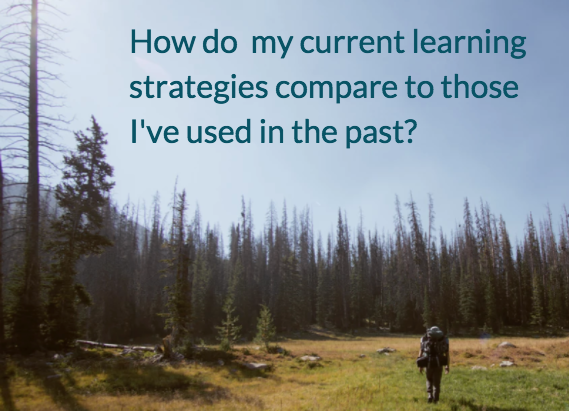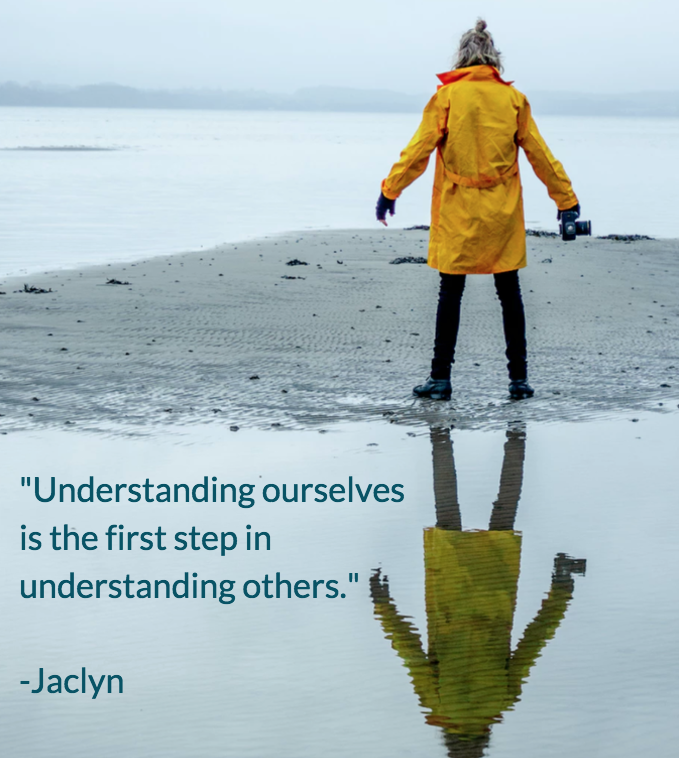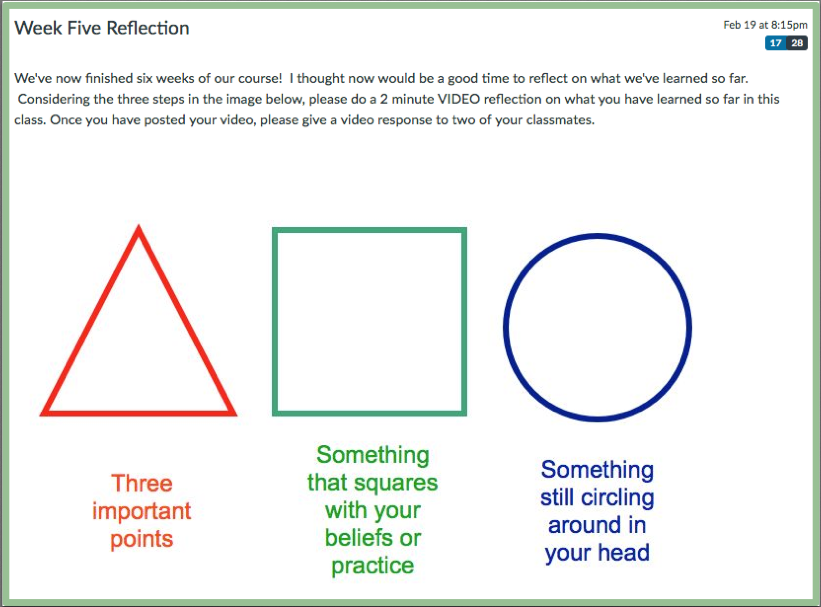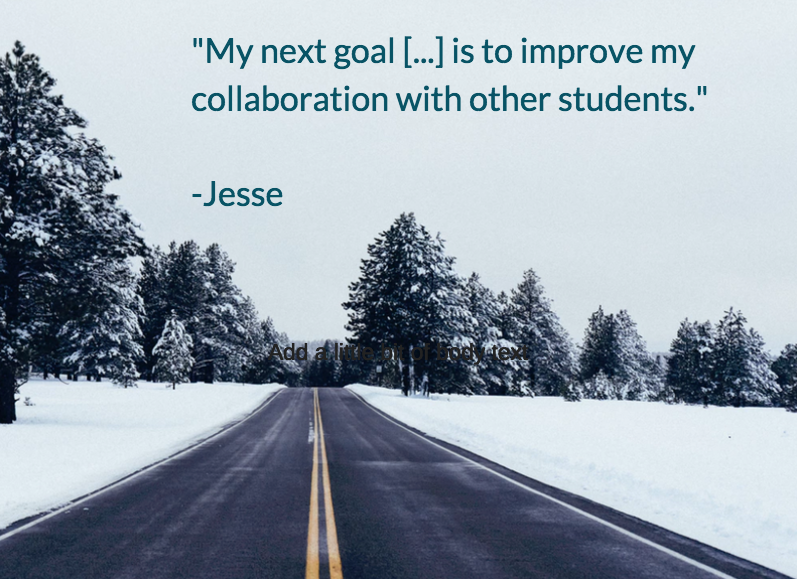3 Ways Online Reflection Promotes Learner Agency in an Age of Urgency
Students and teachers too often fall into the trap of cranking out work, earning or awarding grades and moving on. Unfortunately, this leaves all parties feeling more urgency than agency when it comes to the work they do and the way they do it. In the worst cases, school becomes about completion and compliance rather than engendering the sense of empowerment and exploration we long for.
Liz Coleman has contrasted this kind of “treadmill” education to what she calls “education as an adventure.” One of the tools that GOA teachers keep near at hand for dismantling the urgency treadmill is reflection. Let’s look at three features of outstanding reflective learning experiences from our online courses.
Embrace metacognition: Ask students to think about how they think.
We know that reflecting on our own thinking (metacognition) and our approach to learning is among the most powerful paths to deeper learning. According to Dutch psychologist Marcel Veenman, metacognitive skills are an even better indicator of learning success than IQ. What’s more, by designing opportunities for reflection, teachers invite students to hold themselves accountable for the learning and for charting their own path forward. We should be asking our students what a given learning experience was like for them, how they thought through a particular problem, and what approaches have been successful (or unsuccessful).
David Peabody (GOA & University Prep teacher) leverages metacognition to its fullest in his Power Lab course. Becoming an independent learner is a heavy lift for a lot of adolescents. David asks students to reflect on their approach to the learning using a weekly self assessment of their online presence. By requiring a self-assessment rubric with a video narrative, David shepherds students toward thoughtful, honest reflection that deepens learning. Among other things, students ask themselves if they have been using data to substantiate their claims, if they have effectively applied power frameworks to the world around them, and how they would compare their current learning strategies to those they have used in the past.
Promote Linkage: Ask students to connect ideas to their lives.
Carey Pohanka (GOA and St. Christopher’s School teacher) takes a similar approach in her Advocacy course, though she explicitly asks students to consider relationships between and among course concepts. Strong reflective experiences (like Carey’s) ask students what patterns they see developing, how what they are learning now relates to what they studied last month, and what overarching systems of thought can they see in the discipline. Carey asks students to think about key ideas from the first five weeks of the course, thus inviting them to draw connections and seek patterns.
The idea that both Carey and David seize upon is to use reflection as a tool that encourages students to pick their heads up, take a step back from the requirements of a particular assignment (aka, “the treadmill”), and think about the course, their work and their goals in a broader context. After all, if it’s instructructive to articulate relationships between concepts, it’s doubly important for students to anchor those concepts in their lives. As Advocacy student Jaclyn, a 12th-grader at Lake Highland Preparatory School, said: “Being able to understand ourselves is the first step in being able to understand others.”
Reflect Forward: Ask students to set goals based on feedback.
It’s both counterintuitive and plain-as-day that the main purpose of reflection in learning is to project students forward toward their goals. Jamie Suzuki (GOA and Greens Farms Academy teacher) asks students to do a mid-semester reflection and goal-setting activity. Jamie’s Organic Chemistry students analyze the feedback she has given them and then post a public reflection articulating a learning outcome on which they hope to improve. Jesse, a 12th-grader at Hong Kong International School is clearly using the reflection designed into this course to effectively set and attain his goals. Jesse says:
Looking back on the last month, I think my initial goal to improve my independence and organization has worked. In our most recent module, I was able to complete all the assignments and projects on time. My next goal […] is to improve my collaboration with other students. I plan to do this by contributing earlier in discussions and communicating with my group partners as soon as possible.
Not only does the experience require Jesse and his classmates to digest their feedback, but it’s forward-looking and inspires a sense of community and agency as they give supportive advice to help one another attain their goals.
By focusing on the learning process, recognizing patterns and connecting their reflections to their personal learning goals, these teachers are pushing beyond compliance toward deeper, more personalized learning. The reflective cultures each of them has created routinely encourage students to step back from the day-to-day work of the course and think about where they have come from and where they are going. In Learn Better, Ulrich Boser observes:
There’s an odd thing about rethinking our learning: It makes learning a type of endless process. If we’re always reassessing what we know, we’re never going to stop deliberating. We’re never going to stop reflecting.
By thoughtfully incorporating reflection experiences into our classes, we invite our students into the “endless process” that is life-long learning. In Liz Coleman’s terms, GOA teachers ask their students to step off the treadmill and chart their own learning adventure.
To explore further, visit our Resource Library for Blended and Online Teachers.
Global Online Academy (GOA) offers high quality online, blended, and in person learning experiences for students and educators. Professional learning opportunities are open to any educator. To sign up or to learn more, see our Professional Learning Opportunities for Educators or email hello@GlobalOnlineAcademy.org with the subject title “Professional Learning.”
Follow us on Twitter @GOALearning. To stay up to date on GOA opportunities, sign up for our newsletter here.




